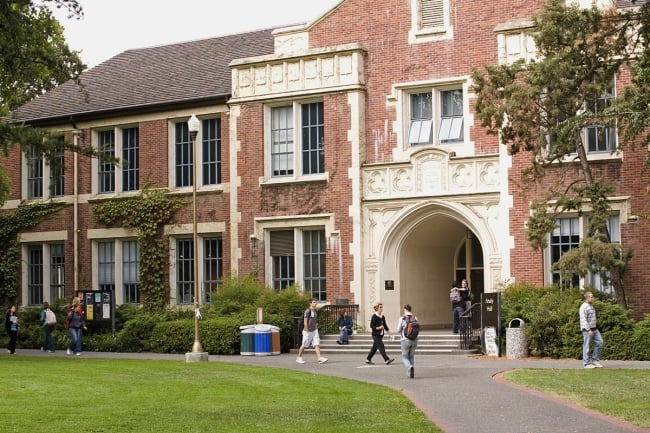You have /5 articles left.
Sign up for a free account or log in.

Santa Rosa Junior College is one of 10 California community colleges participating in a state-funded pilot program that will give some students monthly payments for staying enrolled.
Santa Rosa Junior College
A group of California community colleges is giving some of their most financially vulnerable students money to help pay for their basic needs so they can stay in college and earn degrees.
The Hire UP pilot program, which is funded by a $30 million appropriation the California State Assembly approved in 2022, is designed to give regular monthly cash payments to college students who are formerly incarcerated, former foster youth and low-income parents receiving money from the state’s CalWORKs social assistance program.
“Those are some of the most economically disadvantaged student groups we have,” Gina Browne, an assistant vice chancellor for the California Community Colleges Chancellor’s Office, said, likening the payments to other guaranteed income programs in the state. “As long as a student stays enrolled, they can receive a stipend to help them make it through college.”
While most of the eligible students will likely also be eligible for the California Promise Grant, which covers tuition, they also have to pay for housing, food, transportation, childcare and other basic necessities to support their education. And that’s where Hire UP comes in.
Much like an hourly wage worker earns a paycheck, students enrolled in Hire UP will earn the state minimum wage of $16 an hour, proportional to their course load. That’s the “real equity piece,” Browne said. “Students must be enrolled at least half-time, but at least it’s not just open to the full-time students.”
Alleviating Stress
A full-time Hire UP student, for instance, could take home as much as $10,880 a semester with no limitations on how it can be spent. If a student decides to attend part-time or stops out altogether, their pay is adjusted—or ceases—accordingly.
“These dollars are really designed to help students stay enrolled,” Browne said. “When they know they have consistent money coming, it alleviates that stress of having to pay for rent, a car, buying books, fixing their computer. Whatever the case may be, that’s what these dollars are meant to address.”
According to the National Center for Education Statistics, 22.6 percent of undergraduates experience food insecurity, while 8 percent experience homelessness. And student parents as well as those who were once incarcerated or part of the foster care system are more likely to experience those hardships.
These students also have lower college graduation rates than their peers.
Formerly incarcerated people are eight times less likely to complete college than the general public, according to a 2018 report by the Prison Policy Initiative. Just 2 to 6 percent of former foster youth go on to earn a two-year degree, and 3 to 4 percent earn a four-year degree, according to the National Foster Youth Institute. And more than half of student parents leave college without graduating, according to the Institute for Women’s Policy Research.
The Hire UP pilot is set to run for five years. It’s already launched at Santa Rosa Junior College this semester, and nine additional institutions are expected to join by the fall. Santa Rosa enrolls about 600 formerly incarcerated students, former foster youth and CalWORKs recipients, and they have an average unmet financial need of around $15,000 per academic year, according to the college.
Scott Myers-Lipton, a professor emeritus of sociology at San José State University who has written multiple books about poverty, said he’s supportive of Hire UP as a student success strategy.
“If you can give students resources so they don’t have to work, they can spend more time studying and not have their grades suffer,” he said. “Most of the students at Stanford aren’t working like the ones at San José State or the community colleges.”
More time to focus on his studies is exactly what Steven Cesario, a formerly incarcerated student at Santa Rosa who aspires to earn a degree in psychology or social work, needed last semester. He was balancing a full-time course load with a 50-hour workweek at a local delicatessen. Time and money got so tight in Sonoma County, where the median monthly rent is $2,482, that he wondered if he could afford to stay enrolled in college.
“The classes I had to take were right smack-dab in the middle of the day. So I had to miss a day and a half of work every week,” he said, adding that even with a grant that covered his tuition, he was still short on money to pay his other bills. “That put me in a position of having to put things on credit cards and rapidly put me into debt.”
When he found out that he qualified for a monthly stipend through Hire Up, Cesario thought it was a joke, but he has since accepted it as “a gift from the universe.” He’s looking forward to receiving the first payment, at which point he plans to reduce his working hours and get closer to his goal of helping people who struggle with addiction as he once did.
“It’s such a relief to know the struggle is going to be lessened,” he said. “I can devote more time to studying and my education and not have to worry about money as much.”
Cesario has also gotten additional academic and social support from the Rising Scholars Network, a consortium of California community colleges that provides support for formerly incarcerated students.
Integrating such targeted support programs into the delivery of Hire UP is also part of the plan, said Rachael Cutcher, director of student financial support and services at Santa Rosa. Students participating in the program are required to declare an educational goal—whether that’s earning a certificate, an associate degree or transferring to a bachelor’s program—and develop a strategy to achieve it.
“Our counseling team has those conversations with students to help them figure out what their educational goals are,” Cutcher said. “We’re giving them the financial support and making sure that they have the academic and social support around them.”
While there is a finite amount of money for Hire UP, so far the college has accepted every eligible student who has applied. Cutcher told CalMatters, however, that it won’t have enough money to support all 600 eligible students currently enrolled, so the college will prioritize formerly incarcerated students, who typically have limited access to other supports.
And since the program will track all of its participants over a five-year period, it will also help colleges determine when students are struggling academically or why they stopped out.
“Was there something going on? Did they need more support?” Cutcher said of the questions tracking students can answer. “That’s good information for us.”
Participating community colleges will use the data they collect to gauge the success of Hire UP and potentially advocate for more funding in the future.
“We want to show and demonstrate by usage and good outcomes that these programs are needed and can result in student success,” Cutcher said. “It’s not employment. It’s not work-study. It’s treating school as a student’s primary work.”







